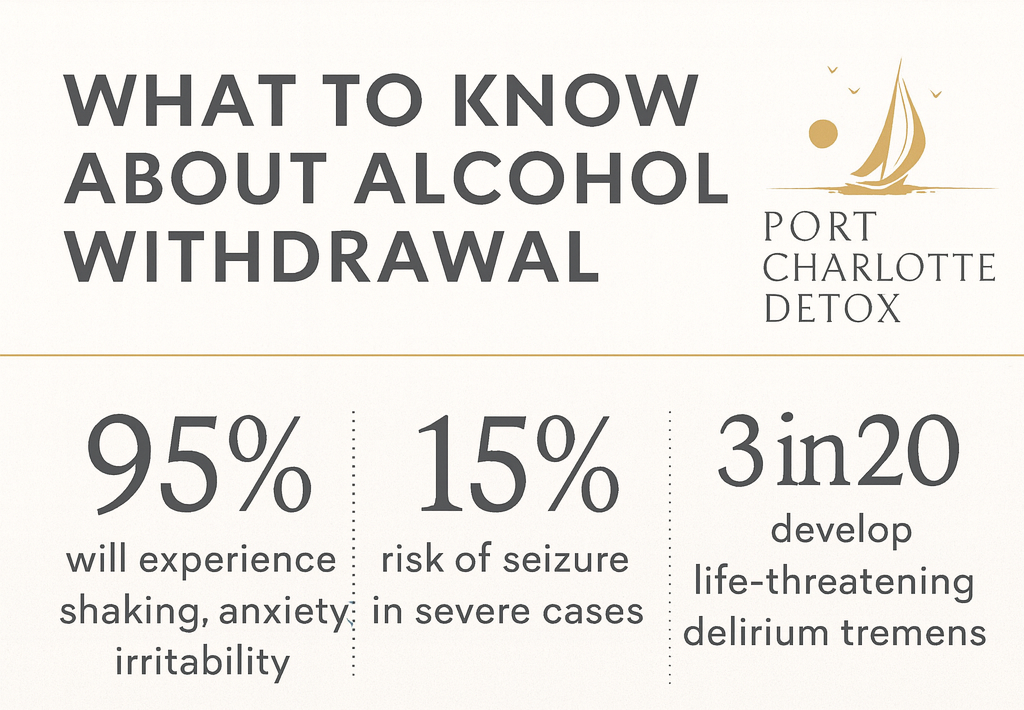When your child is unraveling in front of you—maybe shaking, sweating, or saying things that don’t make sense—it’s not just about drinking anymore. It’s about danger. And deep down, you know: this isn’t something you can manage at home. Alcohol detox is more than just sobering up. It’s a critical medical intervention—one that can protect your child’s life and restore some stability to yours.
At Port Charlotte Detox, our Alcohol Detox Center in Port Charlotte, Florida offers the kind of support most parents don’t even know exists until they’re desperate enough to search. You’re not alone, and you’re not out of options.
Detox Isn’t the Whole Journey—But It’s the Turning Point
Alcohol detox is often misunderstood as just a drying-out period. But the truth is, it’s medical. It’s supervised. And for many young adults, it’s the difference between a dangerous withdrawal at home—and a safe, supported return to clarity.
Why it matters:
- Withdrawal symptoms can be unpredictable.
- Mental health crises can spike during detox.
- Medical monitoring reduces risk of seizures and DTs.
- It sets the stage for real recovery—not just white-knuckled abstinence.
Detox doesn’t fix everything. But it creates the conditions where healing can actually begin.
Alcohol Withdrawal Isn’t Just Unpleasant—It Can Be Deadly
One of the most dangerous misconceptions parents face is believing that their child can “just stop drinking.” We want to believe that a strong will or a tough week will scare them sober. But alcohol withdrawal can escalate quickly into a medical emergency.
Common early symptoms include:
- Shaking or tremors
- Sweating and insomnia
- Headaches and nausea
- High anxiety and irritability
But within 24–72 hours, symptoms can progress into:
- Seizures
- Hallucinations
- Delirium Tremens (DTs) — a life-threatening condition with confusion, rapid heartbeat, fever, and violent shaking
That’s why supervised detox matters—especially in a setting like our Alcohol Detox Center in Charlotte County, where we’re equipped to handle both physical withdrawal and psychiatric instability.
Your Child Might Be Drinking to Cope With Something Bigger
If you’re seeing erratic behavior, paranoia, rage, or deep emotional swings alongside the alcohol use—it’s not just the alcohol. It could be masking (or worsening) an underlying behavioral health condition like depression, anxiety, bipolar disorder, or psychosis.
Trying to treat one without addressing the other is like putting a bandage on a broken leg. That’s why a quality detox program should also include mental health support—so your child isn’t just physically stabilized but emotionally seen.
At Port Charlotte Detox, we treat both. Because we know: detox isn’t just about sobriety. It’s about making the chaos stop—safely.
What Medical Detox Actually Looks Like
You’re not throwing your child into a sterile room and walking away. In our Alcohol Detox Center in Port Charlotte, detox is medical, yes—but it’s also humane, respectful, and trauma-informed.
Here’s what your child will experience:
- 24/7 Medical Monitoring: Nurses and physicians manage symptoms, administer medications, and respond to complications.
- Withdrawal Medications: These ease the intensity of symptoms, reduce cravings, and prevent seizures.
- Nutritional and Hydration Support: Alcohol depletes the body—replenishment is part of stabilization.
- Mental Health Assessment: Co-occurring disorders like depression, anxiety, or trauma are screened and stabilized.
- Emotional Containment: Staff are trained to de-escalate panic, rage, and crisis behavior with care and precision.
And maybe most importantly—you’ll finally be able to sleep, knowing someone else is holding the line.
“I Thought Detox Was Just for People Who Hit Rock Bottom”
No. Detox is for anyone whose body has become dependent on alcohol—even if they’re still functioning in some ways.
It’s for the student who’s failing quietly while drinking secretly.
It’s for the 22-year-old who started drinking to manage anxiety—and now can’t stop.
It’s for the young adult who’s hearing things, seeing things, or slipping away from reality—and alcohol is fueling the fire.
If any of this sounds like your child, they don’t need to hit bottom. They need a safe way out—before the bottom hits them.
If you’re based nearby, we also serve those looking for an alcohol detox center in Fort Myers FL.
You’re Not a Bad Parent—You’re a Tired One Who Cares
This part’s for you.
You are not weak for being scared.
You are not dramatic for calling it a crisis.
You are not to blame for not being able to fix this.
Alcohol detox might not be what you envisioned for your child. But neither was this chaos.
Choosing detox isn’t giving up—it’s finally getting help from people trained to hold this level of pain.
You love your child. You’ve done everything you can. It’s okay to let someone else step in now.
FAQ: Alcohol Detox and Young Adults in Crisis
What makes alcohol detox dangerous to do at home?
At-home detox is risky because alcohol withdrawal can lead to seizures, heart issues, or delirium tremens (DTs)—all of which require medical intervention. A supervised detox ensures these symptoms are identified early and treated properly.
How long does alcohol detox take?
Most alcohol detoxes last 3 to 7 days, depending on severity of use, health conditions, and co-occurring mental health issues. Some young adults may need a longer stabilization period before moving to treatment.
Will my child be forced into long-term rehab?
No. Detox is a short-term, stabilization-focused intervention. After detox, we collaborate with families to determine the next best step, which may include outpatient care, residential treatment, or therapy.
What if my child refuses detox?
If your child is over 18, they must agree to treatment voluntarily—unless a court order or Baker Act is in place. That said, many young adults agree once they realize detox can reduce their suffering and help them regain control.
Is detox covered by insurance?
Yes, in most cases. We work with many insurance plans and can help verify coverage. Call (844)336-2690 to get a free benefits check with no pressure.
This Is the Moment to Reach Out
You don’t have to keep guessing, Googling, or hoping your child makes it through the night. If their drinking has become dangerous—or their mind is unraveling—detox may be the safest first step forward.
📞 Call us at (844)336-2690 or visit our Alcohol Detox Center in Port Charlotte, Florida to talk with someone who can help.
We’re not here to judge. We’re here to stabilize. And give you both a way forward.



